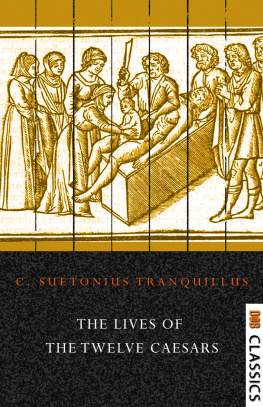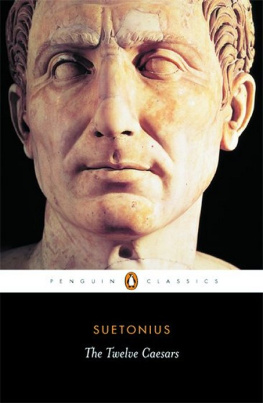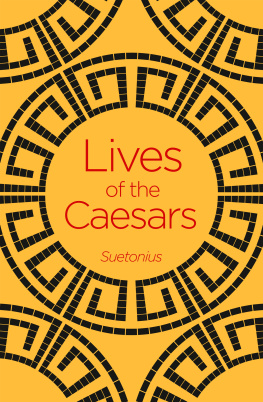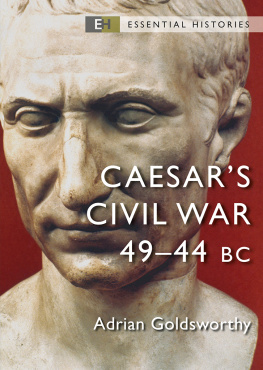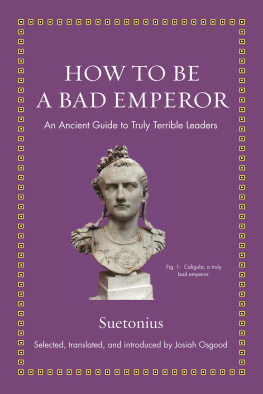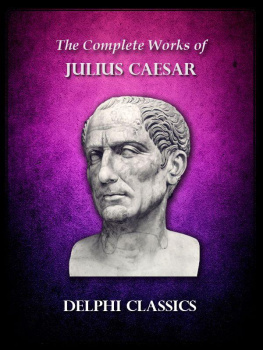Suetonius - The Lives of the Twelve Caesars
Here you can read online Suetonius - The Lives of the Twelve Caesars full text of the book (entire story) in english for free. Download pdf and epub, get meaning, cover and reviews about this ebook. year: 2021, publisher: Delhi Open Books, genre: Science. Description of the work, (preface) as well as reviews are available. Best literature library LitArk.com created for fans of good reading and offers a wide selection of genres:
Romance novel
Science fiction
Adventure
Detective
Science
History
Home and family
Prose
Art
Politics
Computer
Non-fiction
Religion
Business
Children
Humor
Choose a favorite category and find really read worthwhile books. Enjoy immersion in the world of imagination, feel the emotions of the characters or learn something new for yourself, make an fascinating discovery.
The Lives of the Twelve Caesars: summary, description and annotation
We offer to read an annotation, description, summary or preface (depends on what the author of the book "The Lives of the Twelve Caesars" wrote himself). If you haven't found the necessary information about the book — write in the comments, we will try to find it.
De vita Caesarum (Latin; lit. About the Life of the Caesars), commonly known as The Twelve Caesars, is a set of twelve biographies of Julius Caesar and the first 11 emperors of the Roman Empire written by Gaius Suetonius Tranquillus.
The Lives of the Twelve Caesars — read online for free the complete book (whole text) full work
Below is the text of the book, divided by pages. System saving the place of the last page read, allows you to conveniently read the book "The Lives of the Twelve Caesars" online for free, without having to search again every time where you left off. Put a bookmark, and you can go to the page where you finished reading at any time.
Font size:
Interval:
Bookmark:
THE LIVES OF THE TWELVE CAESARS
BY
C. SUETONIUS TRANQUILLUS
To which are added,
His Lives of the Grammarians, Rhetoricians, and Poets
The Translation of Alexander Thomson, M.D.
Revised and corrected by T.Forester, Esq., A.M.
C. Suetonius Tranquillus was the son of a Roman knight who commanded a legion, on the side of Otho, at the battle which decided the fate of the empire in favour of Vitellius. From incidental notices in the following History, we learn that he was born towards the close of the reign of Vespasian, who died in the year 79 of the Christian era. He lived till the time of Hadrian, under whose administration he filled the office of secretary; until, with several others, he was dismissed for presuming on familiarities with the empress Sabina, of which we have no further account than that they were unbecoming his position in the imperial court. How long he survived this disgrace, which appears to have befallen him in the year 121, we are not informed; but we find that the leisure afforded him by his retirement, was employed in the composition of numerous works, of which the only portions now extant are collected in the present volume.
Several of the younger Plinys letters are addressed to Suetonius, with whom he lived in the closest friendship. They afford some brief, but generally pleasant, glimpses of his habits and career; and in a letter, in which Pliny makes application on behalf of his friend to the emperor Trajan, for a mark of favour, he speaks of him as a most excellent, honourable, and learned man, whom he had the pleasure of entertaining under his own roof, and with whom the nearer he was brought into communion, the more he loved him.
The plan adopted by Suetonius in his Lives of the Twelve Caesars, led him to be more diffuse on their personal conduct and habits than on public events. He writes Memoirs rather than History. He neither dwells on the civil wars which sealed the fall of the Republic, nor on the military expeditions which extended the frontiers of the empire; nor does he attempt to develop the causes of the great political changes which marked the period of which he treats.
When we stop to gaze in a museum or gallery on the antique busts of the Caesars, we perhaps endeavour to trace in their sculptured physiognomy the characteristics of those princes, who, for good or evil, were in their times masters of the destinies of a large portion of the human race. The pages of Suetonius will amply gratify this natural curiosity. In them we find a series of individual portraits sketched to the life, with perfect truth and rigorous impartiality. La Harpe remarks of Suetonius, He is scrupulously exact, and strictly methodical. He omits nothing which concerns the person whose life he is writing; he relates everything, but paints nothing. His work is, in some sense, a collection of anecdotes, but it is very curious to read and consult.
Combining as it does amusement and information, Suetoniuss Lives of the Caesars was held in such estimation, that, so soon after the invention of printing as the year 1500, no fewer than eighteen editions had been published, and nearly one hundred have since been added to the number. Critics of the highest rank have devoted themselves to the task of correcting and commenting on the text, and the work has been translated into most European languages. Of the English translations, that of Dr. Alexander Thomson, published in 1796, has been made the basis of the present. He informs us in his Preface, that a version of Suetonius was with him only a secondary object, his principal design being to form a just estimate of Roman literature, and to elucidate the state of government, and the manners of the times; for which the work of Suetonius seemed a fitting vehicle. Dr. Thomsons remarks appended to each successive reign, are reprinted nearly verbatim in the present edition. His translation, however, was very diffuse, and retained most of the inaccuracies of that of Clarke, on which it was founded; considerable care therefore has been bestowed in correcting it, with the view of producing, as far as possible, a literal and faithful version.
To render the works of Suetonius, as far as they are extant, complete, his Lives of eminent Grammarians, Rhetoricians, and Poets, of which a translation has not before appeared in English, are added. These Lives abound with anecdote and curious information connected with learning and literary men during the period of which the author treats.
T. F.
Julius Caesar, the Divine, although he was suffering from a quartan ague, and having effected his release by bribing the officers who had tracked his footsteps, he at length obtained a pardon through the intercession of the vestal virgins, and of Mamercus Aemilius and Aurelius Cotta, his near relatives. We are assured that when Sylla, having withstood for a while the entreaties of his own best friends, persons of distinguished rank, at last yielded to their importunity, he exclaimedeither by a divine impulse, or from a shrewd conjecture: Your suit is granted, and you may take him among you; but know, he added, that this man, for whose safety you are so extremely anxious, will, some day or other, be the ruin of the party of the nobles, in defence of which you are leagued with me; for in this one Caesar, you will find many a Marius.
II. His first campaign was served in Asia, on the staff of the praetor, M. Thermus; and being dispatched into Bithynia
III. He served also in Cilicia, under Servilius Isauricus, but only for a short time; as upon receiving intelligence of Syllas death, he returned with all speed to Rome, in expectation of what might follow from a fresh agitation set on foot by Marcus Lepidus. Distrusting, however, the abilities of this leader, and finding the times less favourable for the execution of this project than he had at first imagined, he abandoned all thoughts of joining Lepidus, although he received the most tempting offers.
IV. Soon after this civil discord was composed, he preferred a charge of extortion against Cornelius Dolabella, a man of consular dignity, who had obtained the honour of a triumph. On the acquittal of the accused, he resolved to retire to Rhodes, he lost no time in putting to sea in pursuit of the pirates, and having captured them, inflicted upon them the punishment with which he had often threatened them in jest. At that time Mithridates was ravaging the neighbouring districts, and on Caesars arrival at Rhodes, that he might not appear to lie idle while danger threatened the allies of Rome, he passed over into Asia, and having collected some auxiliary forces, and driven the kings governor out of the province, retained in their allegiance the cities which were wavering, and ready to revolt.
V. Having been elected military tribune, the first honour he received from the suffrages of the people after his return to Rome, he zealously assisted those who took measures for restoring the tribunitian authority, which had been greatly diminished during the usurpation of Sylla. He likewise, by an act, which Plotius at his suggestion propounded to the people, obtained the recall of Lucius Cinna, his wifes brother, and others with him, who having been the adherents of Lepidus in the civil disturbances, had after that consuls death fled to Sertorius; which law he supported by a speech.
VI. During his quaestorship he pronounced funeral orations from the rostra, according to custom, in praise of his aunt Julia, and his wife Cornelia. In the panegyric on his aunt, he gives the following account of her own and his fathers genealogy, on both sides: My aunt Julia derived her descent, by the mother, from a race of kings, and by her father, from the Immortal Gods. For the Marcii Reges, that the senate instituted an enquiry respecting the profanation of the sacred rites.
Next pageFont size:
Interval:
Bookmark:
Similar books «The Lives of the Twelve Caesars»
Look at similar books to The Lives of the Twelve Caesars. We have selected literature similar in name and meaning in the hope of providing readers with more options to find new, interesting, not yet read works.
Discussion, reviews of the book The Lives of the Twelve Caesars and just readers' own opinions. Leave your comments, write what you think about the work, its meaning or the main characters. Specify what exactly you liked and what you didn't like, and why you think so.

